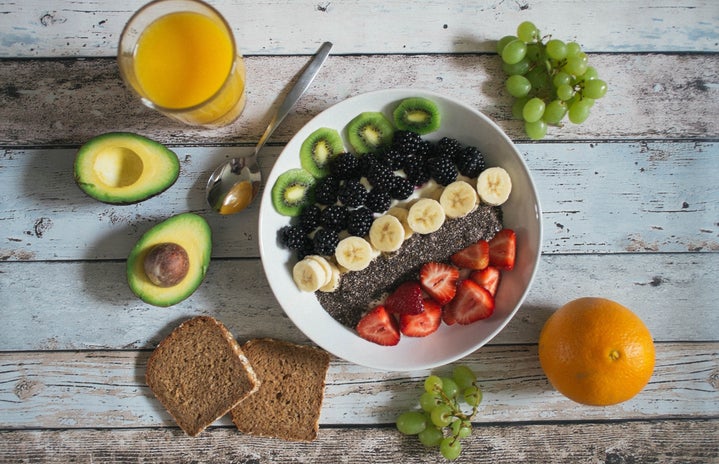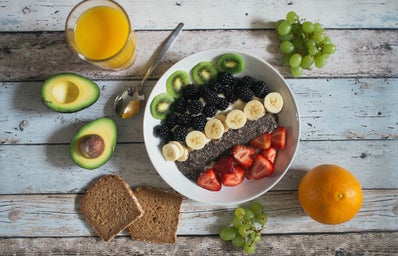One of the best workout/diet pieces of advice I’ve received was pretty obvious. Start seeing food like fuel for your body.
Like…duh! That’s what food is…. it gives you energy. But the more I started putting this advice to perspective, the more conscious I became about my eating habits. I ate a lot because I was bored, not because I needed to fuel my body. I ate a lot of unhealthy foods because it was satisfying to my taste buds. I started to change my relationship with food when I started to exercise more frequently. If you’re a little lost on where to start, here are some tips!
GENERAL TIPS
Don’t work out on an empty stomach. For a standard hour-long workout, you need to make sure you have a combination of carbs and protein to provide a stream of energy during strenuous exercise and nutrients to repair muscle afterward. Here’s a little background information about carbs, proteins, and fats.
CARBS
Your muscles use the glucose from carbs for fuel.
For short and high-intensity exercise, your muscles and liver stores of glycogen are your muscles’ main source of energy (3).
But for longer exercises, the degree to which carbs are used depends on several factors. These include the intensity, type of training and your overall diet (3).
Your muscles’ glycogen stores are limited. As these stores become depleted, your output and intensity diminish (4, 5, 6).
Studies have consistently shown the ability of carbs to increase glycogen stores and utilization while boosting carb oxidation during exercise (6, 7, 8).
Carb loading, which involves consuming a high-carb diet for 1–7 days, is a well-known method to maximize glycogen stores (7, 8).
PROTEIN
Many studies have documented the potential of pre-workout protein consumption to improve athletic performance.
Consuming protein alone or with carbs prior to exercise has been shown to increase muscle protein synthesis (9, 10, 11).
One study showed a positive anabolic response after the ingestion of 20 grams of whey protein before exercise (9).
Other benefits of eating protein before exercise include:
- A better anabolic response, or muscle growth (11, 12).
- Improved muscle recovery (12).
- Increased strength and lean body mass (13).
- Increased muscle performance (11, 12, 13).
FATS
While glycogen is used for short- and high-intensity bouts of exercise, fat becomes the source of fuel for longer and moderate-to-low-intensity exercise (14).
Some studies have investigated the effects of fat intake on athletic performance. However, these studies looked at high-fat diets over a long period of time, rather than prior to exercise (15, 16).
For example, a study showed how four weeks of a diet consisting of 40% fat increased endurance for running times in healthy, trained runners (15).
SOME IDEAS OF WHAT TO EAT BEFORE YOUR WORKOUT
Whole Wheat Toast with Bananas and Cinnamon
When it comes to fuelling up before your workout, carbs are your best friend. Who isn’t happy about that? The key is to have a mixed bag of complex and simple ones so that the release of energy during your workout is slow and steady throughout your routine. Whole-wheat toast with fruit gives you both types of carbs with the bonus of being super easy to digest. Complex carbs will keep your motor humming, while the fruit adds an extra kick of energy. For those training for a race, bananas are perfect in raising potassium levels, which drop when you sweat a lot. For an added bonus, add a dash of cinnamon. The spice has been linked to stabilizing blood sugar and improving brain function.
Oats are packed with fiber, which facilitates a steady release of carbohydrates into your bloodstream, and therefore a steady energy supply throughout your workout. Bananas are very rich in fast-acting carbohydrates that will provide you with usable fuel for a workout, and the supply of potassium aids in maintaining muscle and nerve function.
Greek Yogurt and Fruit
Greek yogurt contains almost double the protein as normal yogurt but about half as much raw sugar as regular yogurt. Fruit is full of fiber and vitamins!
SOME IDEAS ON WHAT TO EAT AFTER YOUR WORKOUT
Grilled Chicken and Vegetables
Your body is in recovery mode, so you need a nutrient-dense dish. The lean protein and carbohydrates in chicken will fill you up without feeling overly bloated. Add some veggies in olive oil to keep your ticker in tip-top shape.
Protein Smoothie
It’s best to eat protein 30 minutes after your workout for maximum muscle building benefits. My personal favorite is coffee and cookies and cream/vanilla protein powder. The protein powder acts as a sweetener and creamer. Also, a little caffeine boost after your workout is always a bonus. I like my double-doubles but this recipe cuts a lot of the excess sugar and empty calories. If you want more of a smoothie texture, add a banana! Protein smoothies are amazing because it’s so easy to customize it to your taste!
Blueberries give your body a huge antioxidant boost. In fact, studies show that blueberries can triple your rate of recovery after intense workouts.
Image Source: https://s-media-cache-ak0.pinimg.com/736x/18/c0/93/18c093095854f743486af4738127d86b.jpg

